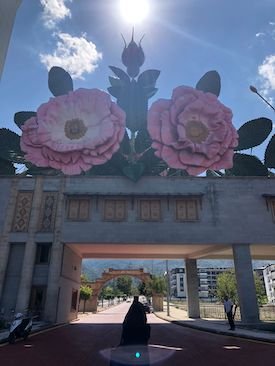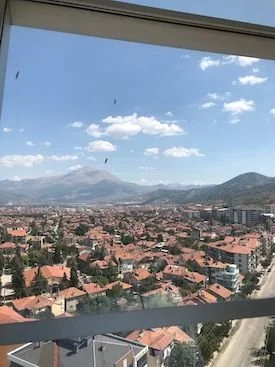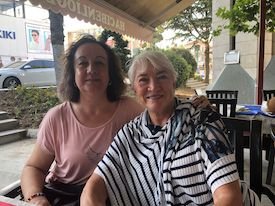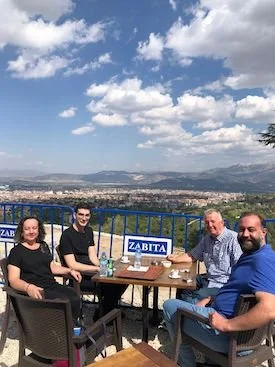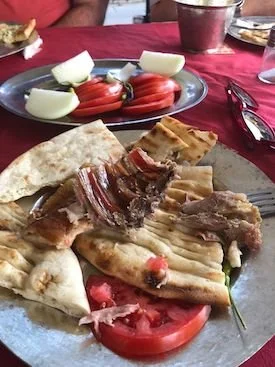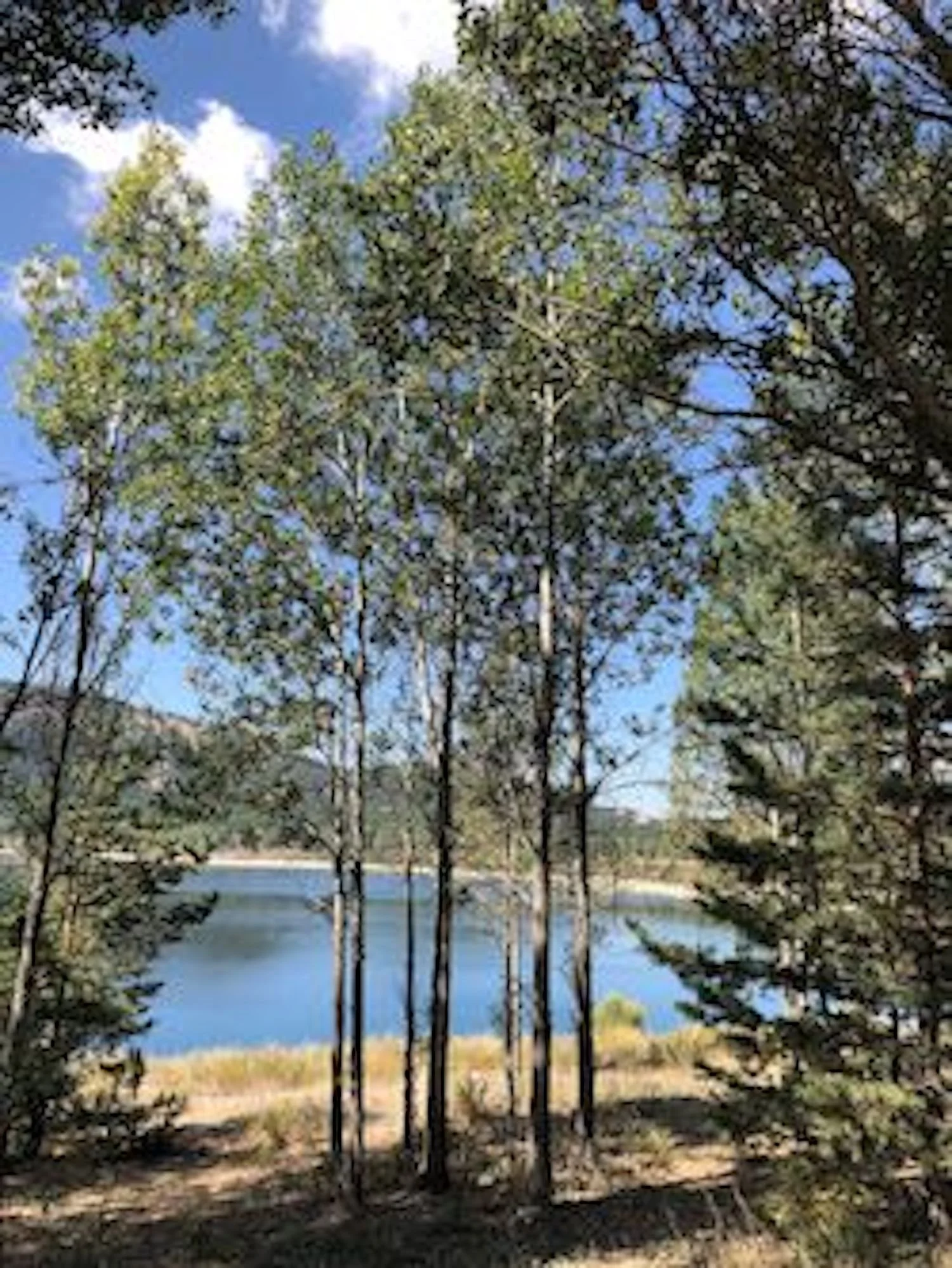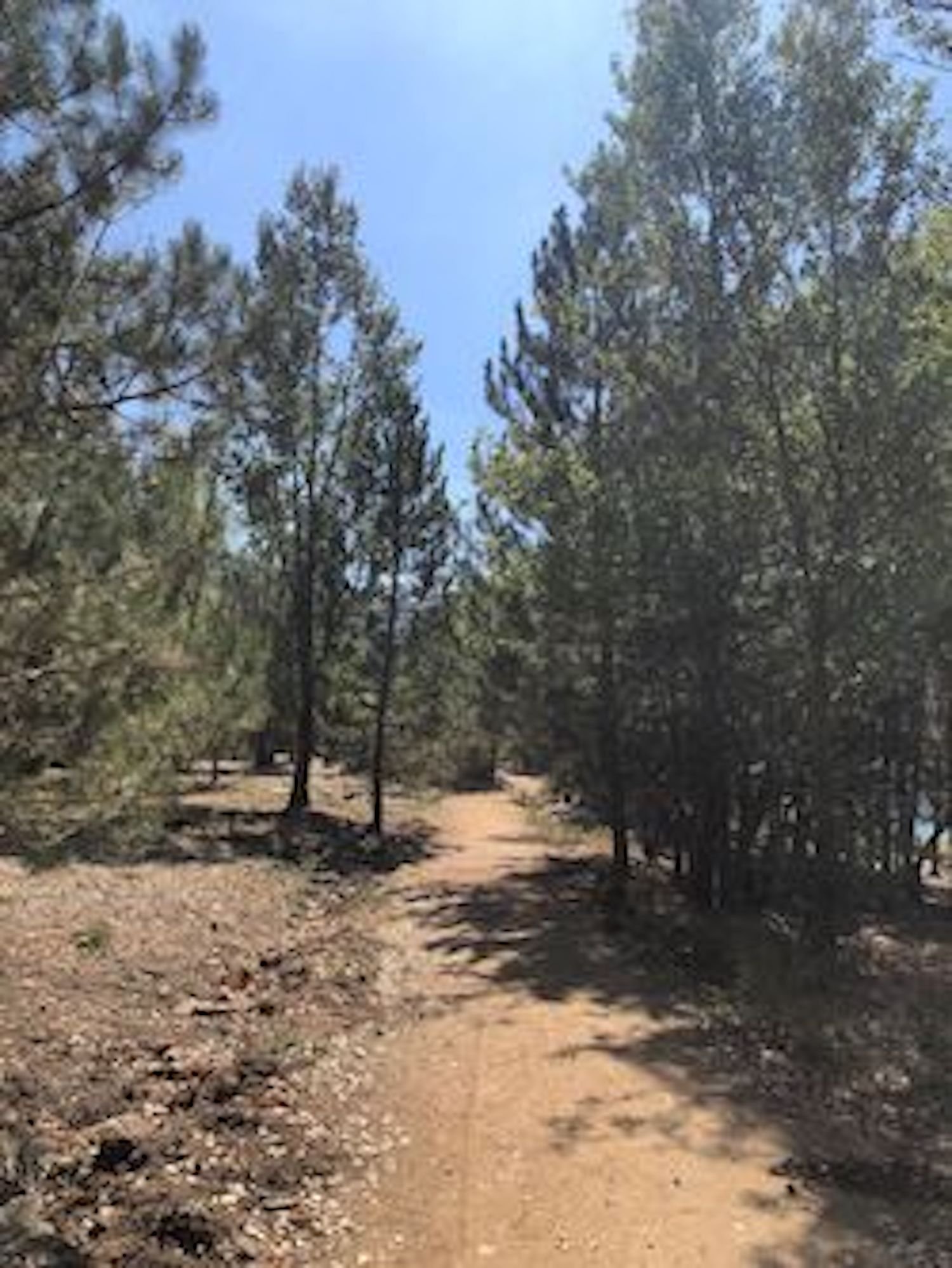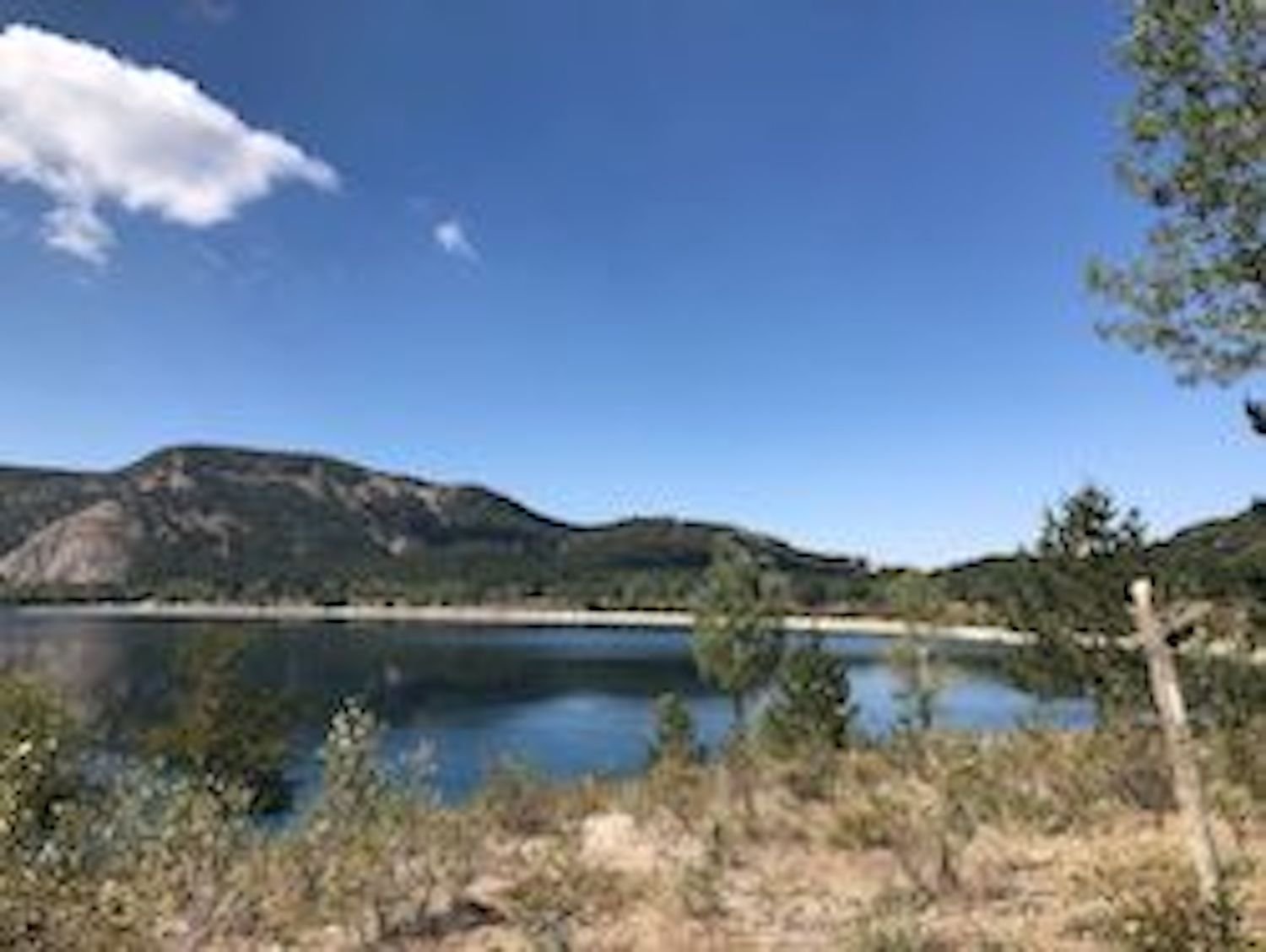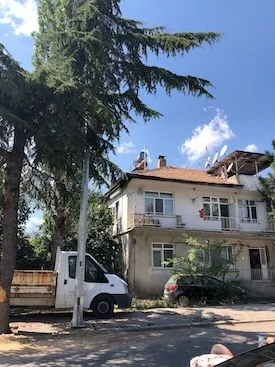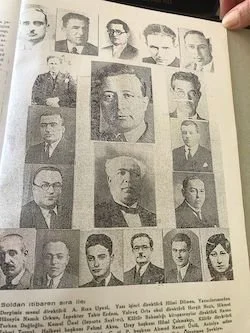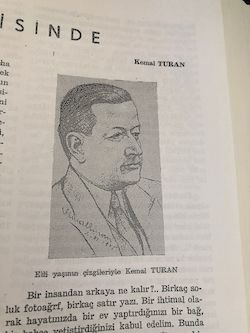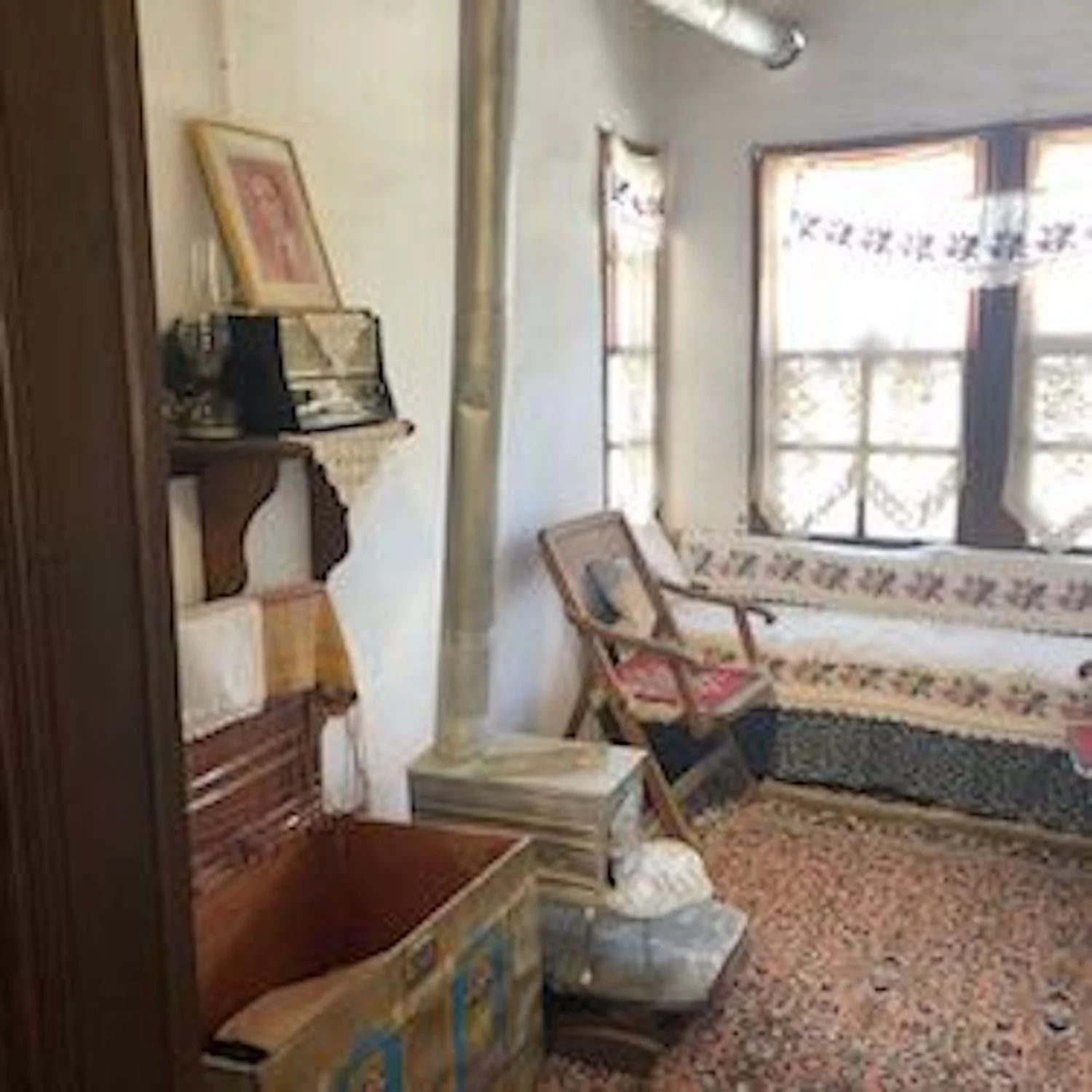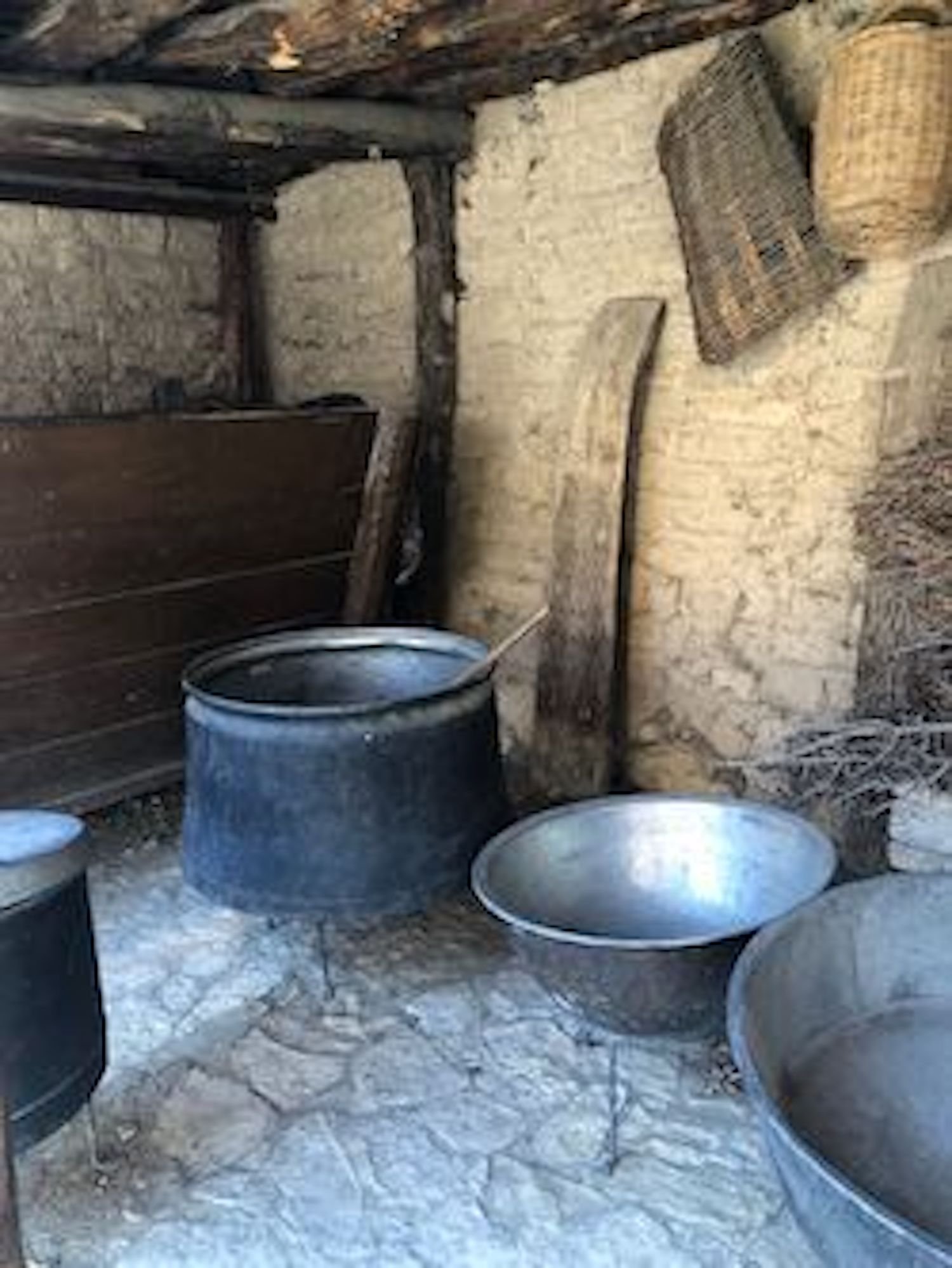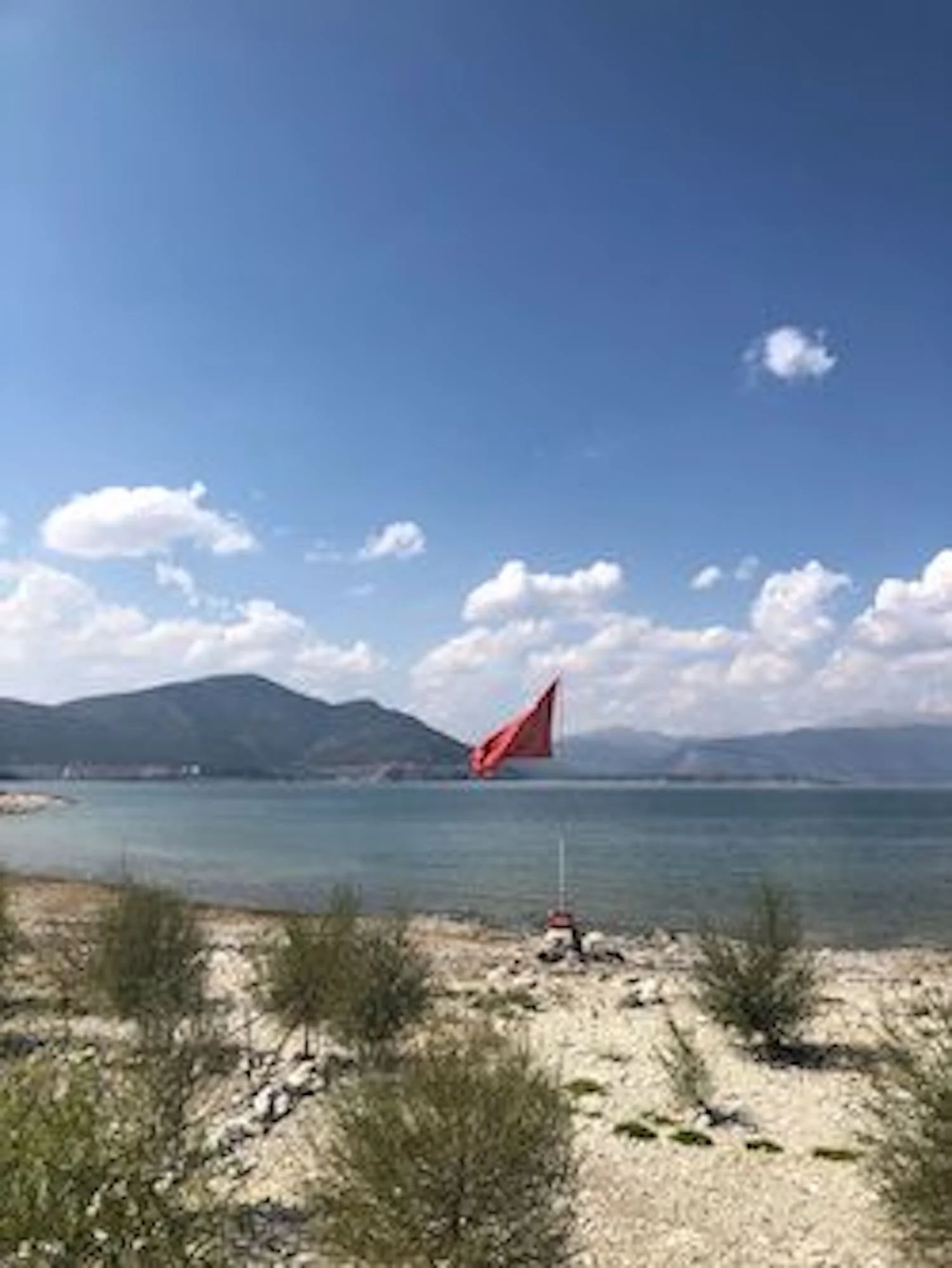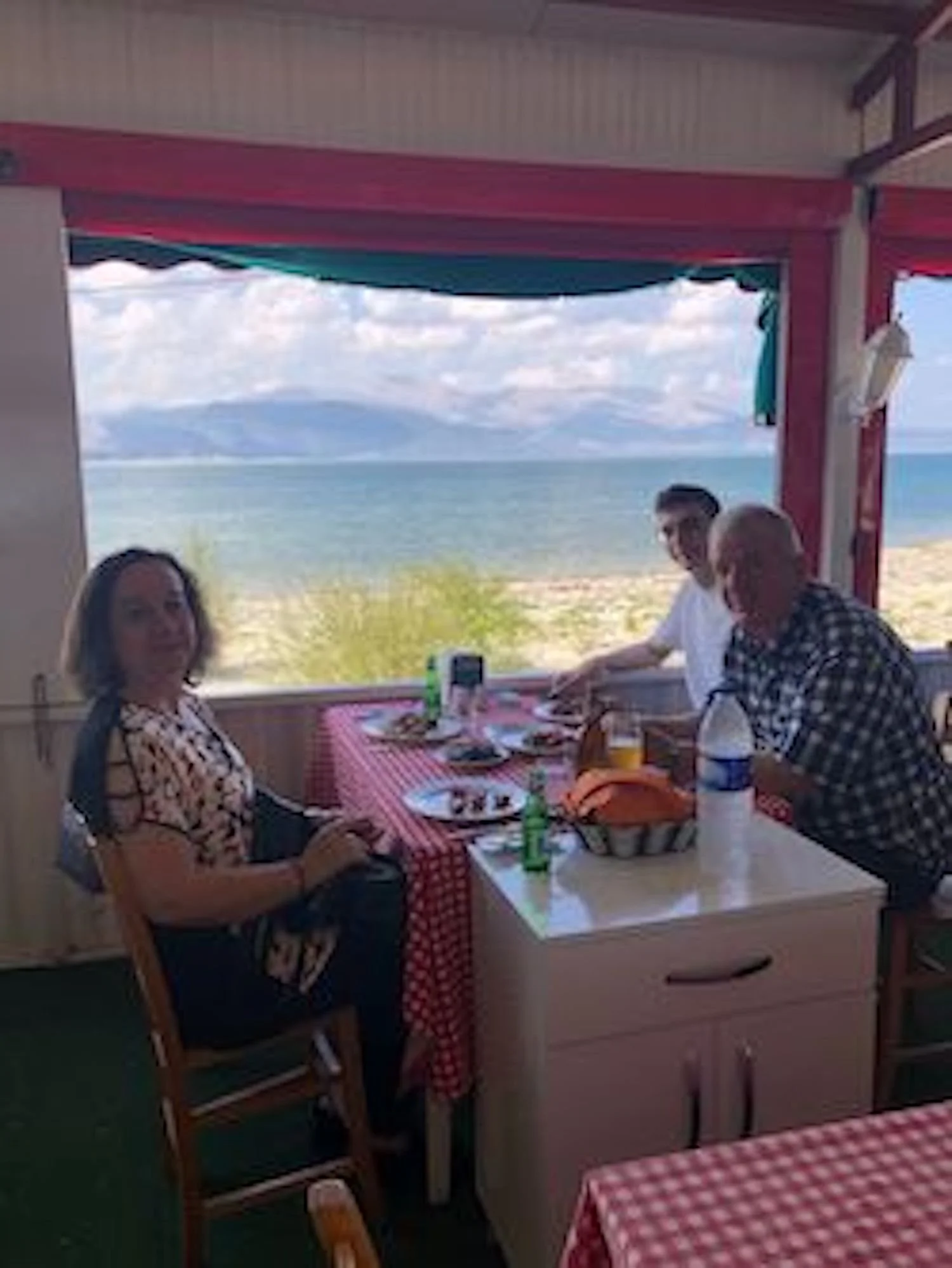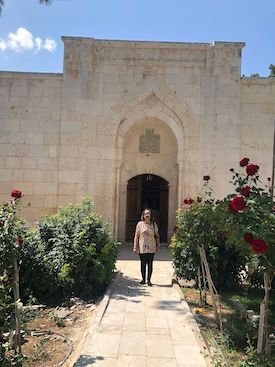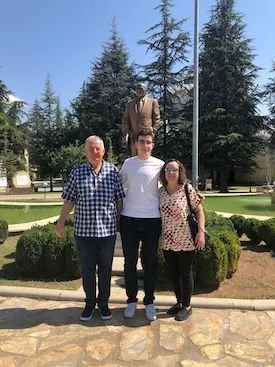Travels to Turkey
Isparta, Part I
September 18, 19 and 20, 2022
My recent trip to Turkey in September was not my first, but it felt that way, as if I was seeing everything with new eyes. Unexpected discoveries, tender, touching moments and unbelievable experiences embraced me at every turn. I made friends with cousins I had never met who live in Isparta where my Turkish father, grandfather, grandmother and ancestors were born. That was really the purpose of my trip–to meet my cousins and experience the lands where my father and ancestors walked and lived. I wondered what I would discover, if there might be a chance to see and understand him better, and likewise, myself.
Dad and I on vacation in Argentario, 1975.
I arrived in Turkey on September 16, landing in Istanbul’s impressive new airport, said to be the largest in the world. I spent a few days there before traveling to Isparta. Unlike flying out of the major airport, I took a domestic flight (which was a very different experience). I stuck out like a tourist, but that was okay. The nice thing about Turkey is that everyone is uber-friendly and accommodating. I did not have one single encounter otherwise. Most of the time I was treated like royalty.
View of Taurus Mountains from Ulku’s apartment.
That was certainly the case when I arrived in Isparta. As I waited for my bags, I saw a woman and two men waving to me through the frosted double doors. I waved back and felt a surge of emotion. I was going to meet a cousin, Ülkü Günes, nee Güngor, who had found me on Facebook some five or even more years ago. All I knew is that Ülkü’s grandfather, Ahmet Güngor, (1901 – 1936) was my grandmother Hayati’s brother.
My first day in Isparta with Ulku.
Unlike my Isparta family, I’ve known my cousins in Istanbul – my father’s niece Gülin, her husband Yavus and son Hakan – since I was a teenager. When I told Gülin I was going to Isparta to meet ülkü she was nonplussed. She knew very little about them and said they had never met. I discovered later that Gülin’s seemingly disinterest had to do with a dispute over family property in Isparta, but I’ll get to that later.
Esra Tasdelen, a professor from North Central College in Naperville, IL, is the Turkish academic who is translating my grandfather’s books. She was supposed to have joined me on this trip to assist with translation and research but had to cancel due to family issues. This proved unfortunate as my Isparta cousins barely spoke any English, but in the end it was a blessing. We bonded and became very close, ülkü and I calling each other “sister,” by the end.
Enjoying the view of Isparta and the company of my family. Ulku's grandfather, Ahmet, was my grandmother Hayati's brother.
Ülkü, her husband Hüseyin Venim (I called him VP) and their adorable, 19-year-old college-bound son, Efe Berkay, were my constant companions for the next two days. Our first stop, right off the plane, was a late lunch at Hacibenliğlu, a famous kebap restaurant in Isparta. The city is also famous for rose oil production, an industry developed by Bulgarian emigres in the 1800s, and is appropriately called, “The City of Roses.” I was too late in the season to see the rose production but not late (ever) for lamb kebap.
Isparta, City of Roses. Gateway to mountains and rose production.
The weather was outstanding–breezy, sunny, in the high 70s. We sat outside under an arbor and were joined by ülkü’s brother Ahmet and his son, Süleyman. They explained the family naming tradition. Vanlizade Haci Ahmet (my great, great grandfather), named his son Süleyman, who named his son named Ahmet, and so on. ülkü’s nephew Süleyman is an urban planner and spoke English which helped with our communications on that very first day, thankfully. But he also shared some amazing family history, a great help to my research. More on this to come.
The lamb kebap arrived, accompanied by a traditional grape (non-alcoholic) drink in a cold metal cup; tomatoes, onions, and pide (flatbread). I must tell you it was the most delicious lamb I’ve ever had in my life, but my gastronomic delights and discoveries did not end at that course. For dessert, I loved the traditional Ottoman kadayif, made with shredded phyllo, nuts and syrup, but I could only eat a bite. If I had eaten everything they ordered for me at each meal and in-between, I would have gained 100 pounds. Let me pause here to tell you that while Turks never, ever stop eating, they are not fat. In fact, 90% are slim and healthy looking. I attribute this to frequent meals and small portions but there is also the constant coffee and tea drinking, and smoking. If anything bothered me on this trip, it was the smoking (which everyone does, nonstop, everywhere).
Lunch at the famous Hacibenlioglue Kebap in Isparta. This is their fire-roasted lamb ribs with pide and traditional grape, clove-scented drink in metal cup.
After lunch we take a short drive to ülkü’s apartment in a newer part of the city. They have a magnificent view of the Taurus mountains, elevation 11K feet and snow-covered in winter. The whole town, population 223,000, is surrounded by mountains and sits in a valley that is home to many agricultural products and exports. Did you know that Turkey is the 4th largest exporter of apples in the world? Isparta has a wonderful, rich history, first settled in Byzantine times. The countryside is mountainous and filled with numerous lakes. It was easy to picture my father and family in this beautiful place and understand their great love of nature, which he passed down to me like a gift.
A visit to Lake Golcuk Golu.
They drove me back to the hotel, a wonderful new Hilton Garden Inn. After a good night’s sleep, they picked me up at 9 am. Our day did not end until nearly twelve hours later.
Yesterday I had given them a list of what I hoped to accomplish on my visit – my grandmother’s history; location of my father’s house; and finding newspapers from the 1900s to 1930s. They made a plan. Our first stop was the population office, or census bureau. After what seemed like typical bureaucratic delays (take a number, take a seat, and the person you need to see is on a coffee break) we are given information with important dates I did not have, like my grandmother’s date of birth and marriage year, as well as the names of her parents. I was elated, part of my mission accomplished.
A house in Isparta in the neighborhood Hisarefendi, where my father grew up.
After the census bureau we drove to the cemetery where I paid my respects to my cousin Tülin, Gülin’s sister, and my Uncle Zeke (Nurhan’s husband, also from Isparta), both buried there. Ülkü said a quiet prayer, hands open to the heavens above.
Next was the town library, a very nice building. I was hoping to find copies of newspapers from the 1900s, but they did not have any on file. They did show me volumes of a journal edited by my grandfather but I’ll have to wait until Esra can help me translate. I am eager to learn the contents and suspect I will learn important information about what occurred in Isparta in the late 19th century and late 20th. So much work to do!
A page from the journals in the Isparta library. My grandfather, the editor, in the center.
Back in the car, we drive through the countryside to Atabey, a small town and home to a museum dedicated entirely to Süleyman Demirel, the ninth president of Turkey. The museum sits in a beautiful green campus with gardens, fountains, a mosque as well as Demirel’s ancestral birthplace. I loved going inside the old wood and stone home, with a second floor and stone courtyard. I imagined the house to be the same as one my grandfather lived in, described in his last book.
Ancestral home of Suleyman Demirel, Turkey's 9th President.
From there we visit an ancient 13th century madrasa (school), built by the Seljuk Turks. We were amazed to find it in great condition, as if it had been built 100 years ago, not 700! Another rich experience later in the day allowed me to travel back further in time but first, lunch!
We drive through hills, going up and then down to an immense blue lake. Eğirdir. Here we are to go to a famous restaurant where they serve two special dishes: fried perch and crawfish.
The outdoor restaurant, called The Big Fish, has spectacular views of the lake. We sit at a table with a red checkered cloth, and in minutes the food arrives. Large platters of crawfish, followed by salad (always sliced tomatoes, onions, cucumbers) and the fried, freshwater perch, Kizarmiş levrek. Again, I am served far more than I can eat and would have preferred the fish grilled instead of fried but could not insult my hosts. Later there is coffee (no thank you) and dessert (no thank you) but we have a wonderful time and meet an American expat with his Turkish wife, which is great because she speaks English! So I’m able to ask a few more questions of my hosts but mostly express my deepest appreciation for their kindness and hospitality and giving me the experience of a lifetime.
This is Lake Erigdir, famous for fried perch which is fished in the lake. We also had crayfish.
From Eğirdir, we drive south toward Burdur and the town of Ağlasun, to reach our destination: a UNESCO World Heritage site called Sagalassos. The hilly countryside is covered with dense scrub, boulders and pine trees, and seems to be mostly uninhabited except for some sad looking shacks and barns with grazing sheep and goats. We stop at one point and VP points to the top of a hill that has a faintly visible access trail. He tells me, as we get out to take a better look, that this is the location of some 40 to 50 acres of land that belonged to my grandmother and has been left to numerous family members, maybe 30 in all. I am told there are some legal complications to taking ownership but they give me copies of all the documentation. When I have time, and when I can find a Turkish lawyer, I will investigate further. In the meantime, my dear cousin Gülin seems to believe, and told me later, that the Isparta cousins want me there so they can take ownership and sell the land to make money. Her supposition seems highly unlikely as ülkü and her husband are very well off with a beautiful apartment and the land in question seems suitable for goats, not villas. It’s clear I need to talk to Gülin about this when I return to Istanbul.
The drive to Sagalassos is over an hour but I don’t mind. Even with our language barrier, I’m getting to know my new friends, Ülkü, VP and Efe.
Ülkü, which means “ideal,” is a lovely, soft-spoken woman with a radiating aura of goodness. She was a Home Economics teacher and is now retired. She also tells me she’s very religious and asks if I believe in God. I do my best to explain that yes, I believe, but my God is nature, I worship the mountains, lakes, skies, forests and flowers, not a specific church or religion. I think she understands and smiles and nods, agreeing we are very much alike. I just love her and vow to learn more Turkish so that next time I can get to know her better. She seems to keep a lot inside.
My cousin Ulku at the madrasa.
When they picked me up at the airport, I noticed her husband VP wore a crisp, ironed short-sleeve shirt, had short hair, and there were pens in his pocket. Assertive and calm, I guess he is a professional of some kind, and I am right. He is a mechanical engineer and worked for a large German-based firm in Isparta. VP is very direct and aware of politics though our conversation about Erdogan, Biden, and Russia is limited. My sense, however, is that like many Turks, he is more pro-Turkey than pro-anyone else and is worried about Turkey’s economy and future. I share his concerns.
Their son Efe is tall, like his father, and reminds me so much of Will and Greg. He is funny, polite and so, so kind. He is headed for university in Istanbul and has done very well on his entrance exams. He says he wants to be a lawyer, like his older sister. I have no doubt he will be. His great spirit lightens our moods and makes our time together so much fun.
Ulku, her son Efe, and husband who I called VP. Our visit to the Demirel Museum in Atakoy.
Did I mention it’s a beautiful day? Blue skies, low 80s. Just perfect. My ancestors are beaming down on me, telling me how glad they are that I have come.

